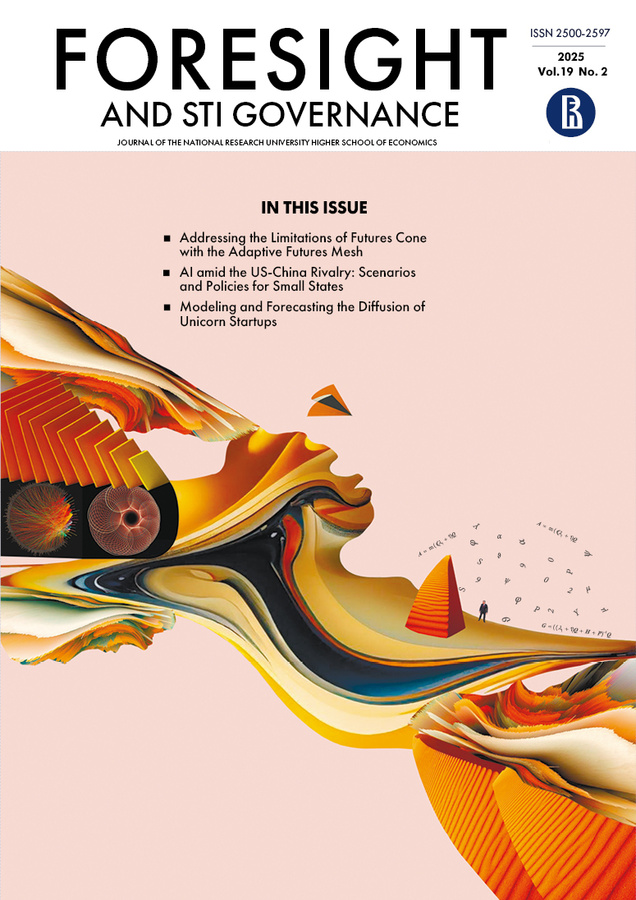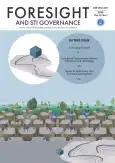Trust-Based Determinants of Future Intention to Use Technology
- Authors: Ejdys J.1
-
Affiliations:
- Bialystok University of Technology
- Issue: Vol 14, No 1 (2020)
- Pages: 60-68
- Section: INNOVATION
- URL: https://journal-vniispk.ru/1995-459X/article/view/346994
- DOI: https://doi.org/10.17323/2500-2597.2020.1.60.68
- ID: 346994
Cite item
Abstract
It is widely recognized that one of the factors determining current and future socioeconomic development is the level of digitalization shaping a new type of society — the information society. One area of ICT application within information society is e-Government. A relatively low level of development of e-Government services in Poland was behind the search for the causes of this phenomenon. Among many technological, organizational, human, economic, social, and cultural factors determining the development of e-Government, many researchers indicated trust as one of the most critical factors. Mistrust is perceived as a basic limitation for the implementation of e-Government solutions. The author’s object of interest was e-Declaration technology, which enables electronic filling and sending of tax returns to tax authorities. This article investigates the relationship between the features of technology users and their trust in the e-Declaration technology and their future intention to use the technology. The researched user traits refer to their general trust, overall trust in technology and science development, and their experience and trust in the internet. Data was collected with the use of the CATI (Computer Assisted Web Interview) technique. Altogether, 1,054 completed questionnaires were selected, containing 100% of the answers. The regression analysis was preceded by an analysis of correlations between variables. The hypotheses were confirmed using the Kruskal–Wallis non-parametric test. The obtained results confirmed positive relationships between Trust in e-Declaration (T) and all tested constructs: General Trust (GT), overall Trust in Science and Technology (TST), Trust in the Internet (TinI) and Internet Experience (IE). Results also confirmed a positive impact of Trust in e-Declaration (T) on the Future Intention (FI) to use the technology. In the adopted regression model, Trust in the Internet was recognized as a key factor in the success of e-Government development. Therefore, the Polish government, which offers solutions in the field of e-Government and wants to increase trust in the technology as well as extend future adaptations of the technology, should concentrate on building trust in the internet and the development of technology and science in general.
About the authors
Joanna Ejdys
Bialystok University of Technology
Email: j.ejdys@pb.edu.pl
45A, Wiejska Street, 15-351 Bialystok, Poland
References
- Agag G.M., El-Masry A.A. (2017) Why Do Consumers Trust Online Travel Websites? Drivers and Outcomes of Consumer Trust toward Online Travel Websites // Journal of Travel Research. Vol. 56. № 3. Р. 347-369. DOI:https://doi.org/10.1177/0047287516643185
- Al-Hujran O., Al-Debei M.M., Chatfield A., Migdadi M. (2015) The imperative of influencing citizen attitude toward e-government adoption and use // Computers in Human Behavior. Vol. 53. Р. 189-203. DOI:https://doi.org/10.1016/j.chb.2015.06.025
- Alzahrani L., Al-Karaghouli W., Weerakkody V. (2017) Analysing the critical factors influencing trust in e-government adoption from citizens' perspective: A systematic review and a conceptual framework // International Business Review. Vol. 26. № 1. Р. 164-175. DOI:https://doi.org/10.1016/j.ibusrev.2016.06.004
- Belanger F., Carter L. (2008) Trust and risk in e-Government adoption // The Journal of Strategic Information Systems. Vol. 17. № 2. Р. 165-176. DOI:https://doi.org/10.1016/j.jsis.2007.12.002
- Carter L., Belanger F. (2005) The utilization of e-government services: Citizen trust, innovation and acceptance factors // Information Systems Journal. Vol. 15. № 1. Р. 5-25. DOI:https://doi.org/10.1111/j.1365-2575.2005.00183.x
- Chen J.V., Jubilado R.J.M., Capistrano E.P.S., Yen D.C. (2015) Factors affecting online tax filing - An application of the IS Success Model and trust theory // Computers in Human Behavior. Vol. 43. Р. 251-262. DOI:https://doi.org/10.1016/j.chb.2014.11.017
- Chopra K., Wallace W.A. (2003) Trust in electronic environments // Proceedings of the 36th Annual Hawaii International Conference on System Science. Piscataway, NJ: IEEE. Р. 123-135.
- Colesca S.E. (2009) Understanding Trust in e-Government // Inzinerine Ekonomika-Engineering Economics. Vol. 63. № 4. Р. 1-15. Режим доступа:http://inzeko.ktu.lt/index.php/EE/issue/view/424, дата обращения 24.05.2019.
- Davis F.D. (1985) A Technology Acceptance Model for empirically testing new and-user information systems: Theory and results. Cambridge, MA: MIT Sloan School of Management.
- Ejdys J., Halicka K. (2018) Sustainable Adaptation of New Technology - The Case of Humanoids Used for the Care of Older Adults // Sustainability. Vol. 10. № 10. Art. 3770. Режим доступа:https://doi.org, дата обращения 15.09.2019. DOI:https://doi.org/10.3390/su10103770
- Gefen D. (2004) What makes an ERP implementation relationship worthwhile: Linking trust mechanisms and ERP usefulness // Journal of Management Information Systems. Vol. 21. № 1. P. 263-288. DOI:https://doi.org/10.1080/07421222.2004.11045792
- Gefen D., Karahanna E., Straub D. (2003a) Trust and TAM in online shopping: An integrated model // MIS Quarterly. Vol. 27. № 1. P. 51-90. DOI:https://doi.org/10.2307/30036519
- Gefen D., Karahanna E., Straub D.W. (2003b) Inexperience and experience with online stores: The importance of TAM and trust // IEEE Transactions on Engineering Management. Vol. 50. № 3. P. 307-321. DOI:https://doi.org/10.1109/TEM.2003.817277
- Halicka K. (2019) Gerontechnology - the assessment of one selected technology improving the quality of life of older adults // Engineering Management in Production and Services. Vol. 11. № 2. P. 43-51. DOI:https://doi.org/10.2478/emj-2019-0010
- Hengstler M., Enkel E., Duelli S. (2016) Applied artificial intelligence and trust - The case of autonomous vehicles and medical assistance devices // Technological Forecasting & Social Change. Vol. 105. P. 105-120. DOI:https://doi.org/10.1016/j.techfore.2015.12.014
- Hernandez-Ortega B. (2011) The role of post-use trust in the acceptance of a technology: Drivers and consequences // Technovation. Vol. 31. № 10-11. P. 523-538. DOI:https://doi.org/10.1016/j.technovation.2011.07.001
- Joshi P., Shareeful I. (2018) E-Government Maturity Model for Sustainable E-Government Services from the Perspective of Developing Countries // Sustainability. Vol. 10. Art. 1882. P. 1-28. DOI:https://doi.org/10.3390/su10061882
- Kaur K., Rampersad G. (2018) Trust in driverless cars: Investigating key factors influencing the adoption of driverless cars // Journal of Engineering and Technology Management. Vol. 48. P. 87-96. DOI:https://doi.org/10.1016/j.jengtecman.2018.04.006
- Khalilzadeh J., Ozturk A.B., Bilgihan A. (2017) Security-related factors in extended UTAUT model for NFC based mobile payment in the restaurant industry // Computers in Human Behavior. Vol. 70. P. 460-474. DOI:https://doi.org/10.1016/j.chb.2017.01.001
- Komiak S.Y.X., Benbasat I.A. (2008) Two-process view of trust and distrust building in recommendation agents: A process-tracing study // Journal of the Association for Information Systems. Vol. 9. № 12. P. 727-747. DOI:https://doi.org/10.17705/1jais.00180
- Kumar V.V.R., Lall A., Mane T. (2017) Extending the TAM Model: Intention of Management Students to Use Mobile Banking: Evidence from India // Global Business Review. Vol. 18. № 1. P. 238-249. DOI:https://doi.org/10.1177/0972150916666991
- Kurfal M., Arifoglu A., Tokdemir G., Pacin Y. (2017) Adoption of e-government services in Turkey // Computers in Human Behavior. Vol. 66. P. 168-178. DOI:https://doi.org/10.1016/j.chb.2016.09.041
- Lankton N.K., McKnight D.H., Tripp J. (2015) Technology, Humanness, and Trust: Rethinking Trust in Technology // Journal of the Association for Information Systems. Vol. 16. № 10. P. 880-918. DOI:https://doi.org/10.17705/1jais.00411
- Lean K., Zailani S., Ramayah T., Fernando Y. (2009) Factors influencing intention to use e-government services among citizens in Malaysia // International Journal of Information Management. Vol. 29. № 6. P. 458-475. DOI:https://doi.org/10.1016/j.ijinfomgt.2009.03.012
- Lee J., Kim H. J., Ahn M.J. (2011) The willingness of e-Government service adoption by business users: The role of offline service quality and trust in technology // Government Information Quarterly. Vol. 28. № 2. P. 222-230. DOI:https://doi.org/10.1016/j.giq.2010.07.007
- Lee M.K.O., Turban E. (2001) A trust model for consumer internet shopping // International Journal of Electronic Commerce. Vol. 6. № 1. P. 75-91. DOI:https://doi.org/10.1080/10864415.2001.11044227
- Lin J., Wang B., Wang N., Lu Y. (2014) Understanding the evolution of consumer trust in mobile commerce: A longitudinal study // Information Technology and Management. Vol. 15. № 1. P. 37-49. DOI:https://doi.org/10.1007/s10799-013-0172-y
- Lippert S.K. (2007) Investigating Postadoption Utilization: An Examination Into the Role of Interorganizational and Technology Trust // IEEE Transactions on Engineering Management. Vol. 54. № 3. P. 468-483. DOI:https://doi.org/10.1109/TEM.2007.900792
- Lippert S.K., Swiercz P.M. (2005) Human resource information systems (HRIS) and technology trust // Journal of Information Science. Vol. 31. № 5. P. 340-353. DOI:https://doi.org/10.1177/0165551505055399
- McKnight D.H., Cummings L.L., Chervany N.L. (1998) Initial trust formation in new organizational relationships // Academy of Management Review. Vol. 23. № 3. P. 473-490. Режим доступа:https://www.jstor.org/stable/259290, дата обращения 09.06.2019.
- Meng D., Min Q., Li Y. (2008) Study on trust in mobile commerce adaptation - A conceptual model // Proceedings of the 2008 International Symposium on Electronic Commerce and Security, 3-5 August, Guangzhou City, China. Piscataway, NJ: IEEE. P. 246-249. Режим доступа: , дата обращения 12.11.2018. DOI:https://doi.org/10.1109/ISECS.2008.54
- Nazarko J., Ejdys J., Halicka K., Magruk A., Nazarko L., Skorek A. (2017) Application of Enhanced SWOT Analysis in the Future-oriented Public Management of Technology // Procedia Engineering. Vol. 182. P. 482-490. DOI:https://doi.org/10.1016/j.proeng.2017.03.140
- Nazarko L. (2016) Responsible Research and Innovation - A New Paradigm of Technology Management. Paper presented at the 9th International Scientific Conference Business and Management 2016, Vilnius Gediminas Technical University. May 12-13, 2016. DOI:https://doi.org/10.3846/bm.2016.71
- Nazarko L. (2017) Future-Oriented Technology Assessment // Procedia Engineering. Vol. 182. P. 504-509. DOI:https://doi.org/10.1016/j.proeng.2017.03.144
- Pavlou P., Fygenson M. (2006) Understanding and predicting electronic commerce adoption: An extension of the theory of planned behaviour // MIS Quarterly. Vol. 30. № 1. P. 115-143. DOI:https://doi.org/10.2307/25148720
- Rousseau D.M., Sitkin S.B., Burt R.S., Camerer C. (1998) Not so different after all: A cross-discipline view of trust // Academy of Management Review. Vol. 23. № 3. P. 393-403. DOI:https://doi.org/10.5465/amr.1998.926617
- Tams S., Thatcher J. B., Craig K. (2018) How and why trust matters in post-adoptive usage: The mediating roles of internal and external self-efficacy // Journal of Strategic Information Systems. Vol. 27. P. 170-190. DOI:https://doi.org/10.1016/j.jsis.2017.07.004
- Venkatesh V., Thong J.Y., Xu X. (2012) Consumer acceptance and use of information technology: Extending the unified theory of acceptance and use of technology // MIS Quarterly. Vol. 36. № 1. P. 157-178. DOI:https://doi.org/10.2307/41410412
- Voutinioti A. (2013) Determinants of User Adoption of e-Government Services in Greece and the role of Citizen Service Centres // Procedia Technology. Vol. 8. P. 238-244. Режим доступа: , дата обращения 08.08.2019. DOI:https://doi.org/10.1016/j.protcy.2013.11.033
- Weerakkody V., El-Haddadeh R., Al-Sobhi F., Shareef M.A., Dwivedi Y.K. (2013) Examining the influence of intermediaries in facilitating e-government adoption: An empirical investigation // International Journal of Information Management. Vol. 33. № 5. P. 716-725.
- Williams M.D., Rana N.P., Dwivedi Y.K. (2015) The unified theory of acceptance and use of technology (UTAUT): A literature review // Journal of Enterprise Information Management. Vol. 28. № 3. P. 443-488. DOI:https://doi.org/10.1108/JEIM-09-2014-0088
- Wu K., Zhao Y., Zhu Q., Tan X., Zheng H. (2011) A meta-analysis of the impact of trust on technology acceptance model: Investigation of moderating influence of subject and context type // International Journal of Information Management. Vol. 31. № 6. P. 572-581. DOI:https://doi.org/10.1016/j.ijinfomgt.2011.03.004
- Zhou T. (2011) An empirical examination of initial trust in mobile banking // Internet Research. Vol. 21. № 5. P. 527-540. DOI:https://doi.org/10.1108/10662241111176353
Supplementary files









